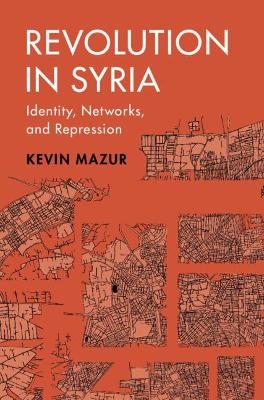
Revolution in Syria
Identity, Networks, and Repression
Seiten
2021
Cambridge University Press (Verlag)
978-1-108-84327-0 (ISBN)
Cambridge University Press (Verlag)
978-1-108-84327-0 (ISBN)
This book is for scholars of contentious politics, conflict, ethnicity, and the Middle East, as well as anyone seeking to understand the Syrian conflict. Using new quantitative data and Arabic-language sources, Mazur traces local trajectories of conflict and how they produced a civil war fought mostly along ethnic lines.
How does protest advancing diverse claims turn into violent conflict occurring primarily along ethnic lines? This book examines that question in the context of Syria, drawing insight from the evolution of conflict at the local level. Kevin Mazur shows that the challenge to the Syrian regime did not erupt neatly along ethnic boundaries, and that lines of access to state-controlled resources played a critical structuring role; the ethnicization of conflict resulted from failed incumbent efforts to shore up network ties and the violence that the Asad regime used to crush dissent by challengers excluded from those networks. Mazur uses variation in the political and demographic characteristics of locales to explain regime strategies, the roles played by local intermediaries, the choice between non-violent and violent resistance, and the salience of ethnicity. By drawing attention to cross-ethnic ties, the book suggests new strategies for understanding ostensibly ethnic conflicts beyond Syria.
How does protest advancing diverse claims turn into violent conflict occurring primarily along ethnic lines? This book examines that question in the context of Syria, drawing insight from the evolution of conflict at the local level. Kevin Mazur shows that the challenge to the Syrian regime did not erupt neatly along ethnic boundaries, and that lines of access to state-controlled resources played a critical structuring role; the ethnicization of conflict resulted from failed incumbent efforts to shore up network ties and the violence that the Asad regime used to crush dissent by challengers excluded from those networks. Mazur uses variation in the political and demographic characteristics of locales to explain regime strategies, the roles played by local intermediaries, the choice between non-violent and violent resistance, and the salience of ethnicity. By drawing attention to cross-ethnic ties, the book suggests new strategies for understanding ostensibly ethnic conflicts beyond Syria.
Kevin Mazur is Future of Conflict Fellow in the Empirical Studies of Conflict Project at Princeton University. He was previously a Postdoctoral Prize Research Fellow at Nuffield College, University of Oxford and has conducted extensive fieldwork in the Arab world.
1. Introduction; 2. Theory; 3. Networks, identities, and patronage in contemporary Syria; 4. Events of the Syrian uprising; 5. Initial forms of challenge; 6. State networks and non-participation; 7. Logics of state repression and societal response; 8. Particularizing challenge in Kurdish areas; 9. Conclusion.
| Erscheinungsdatum | 28.06.2021 |
|---|---|
| Reihe/Serie | Cambridge Studies in Comparative Politics |
| Zusatzinfo | Worked examples or Exercises |
| Verlagsort | Cambridge |
| Sprache | englisch |
| Maße | 159 x 235 mm |
| Gewicht | 640 g |
| Themenwelt | Geisteswissenschaften ► Geschichte ► Regional- / Ländergeschichte |
| Sozialwissenschaften ► Politik / Verwaltung ► Europäische / Internationale Politik | |
| Sozialwissenschaften ► Politik / Verwaltung ► Vergleichende Politikwissenschaften | |
| ISBN-10 | 1-108-84327-1 / 1108843271 |
| ISBN-13 | 978-1-108-84327-0 / 9781108843270 |
| Zustand | Neuware |
| Haben Sie eine Frage zum Produkt? |
Mehr entdecken
aus dem Bereich
aus dem Bereich
Erinnerungen
Buch | Softcover (2024)
Pantheon (Verlag)
16,00 €
Universalgelehrter, Polarreisender, Entdecker
Buch | Hardcover (2024)
mareverlag
28,00 €


